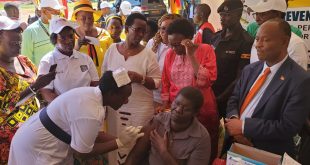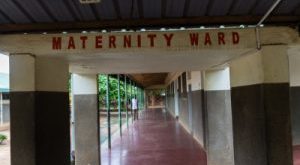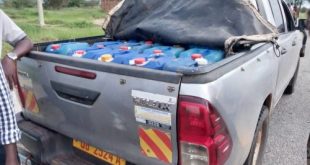
By Timothy Eodu
Over 500 Fistula patients across Uganda have been treated between April 2021 to June 2022 quarter, according to a report published by TEREWODE Women’s Community Hospital. Obstetric fistula is one of the most serious and tragic childbirth injuries. A hole between the birth canal and bladder and/or rectum, it is caused by prolonged, obstructed labour without access to timely, high-quality medical treatment.
It leaves women and girls leaking urine, faeces or both, and often leads to chronic medical problems, depression, social isolation and deepening poverty. A fistula is an abnormal connection between two body parts, such as an organ or blood vessel and another structure. Fistulas are usually the result of an injury or surgery. Infection or inflammation can also cause a fistula to form. Uganda has approximately 200,000 women living with fistula and 2,000 annual incident cases.
Half a million women and girls in sub-Saharan Africa, Asia, the Arab States region and Latin America and the Caribbean are estimated to be living with fistula, with new cases developing every year. Yet fistula is almost entirely preventable. Its persistence is a reminder of gross inequities, a sign of global inequality and an indication that health and social systems are failing to protect the health and human rights of the poorest and most vulnerable women and girls.
According to TERREWODE Women’s Community Hospital 12th edition Newsletter of April-June 2022, a total of 103 patients received care from the facility and 74 from their various partner health facilities in the quarter across the country. Cumulatively, it stated that they had 572 patients treated out of the hospital’s annual target of 600. TWCH treated 362 women and girls against an annual target of 400; while the partner hospitals dealt with 210 patients.
According to Alice Emasu Seruyange, Founder and Executive Director of TERREWODE and TWCH, in the same quarter, a total of 121 survivors received reintegration service. She said cumulatively, they served 448 survivors against their annual target of 400 and a few survivors received portions of these services which they provide according to the individual needs.
Additionally, the survivors undertook courses covering leadership, group formation and management, counseling, health education, gender, and human rights and their linkages to obstetric Fistula and overall poor maternal health outcomes, she added.
Terrewode Women’s Community Hospital (TWCH), located in Soroti is the first and only state-of-art, patient-centered super-specialized hospital for the management of Obstetric Fistula in Uganda and East Africa with an annual treatment capacity of 400 patients. It is a subsidiary of TERREWODE, the parent entity and it partners with Uganda’s Ministry of Health and other stakeholders addressing Obstetric Fistula.
TWCH provides holistic, routine and respectful care to women and girls suffering from OF. It operates three theatre days per week and patient screening is conducted from Monday to Friday with two dedicated resident specialist doctors. Women and girls who seek care at TWCH are provided with care takers and all services related to their treatment are free but are paid for by partners.
Included in the hospital complex is a 30 bed reintegration center, complete with counseling rooms, space for training in income generating skills and Uganda’s first physical Therapy program for women with Fistula.

Fistula Survivor Turn into Maternal Health change Agents
Margrete Arago, a resident of Abarilela sub-county in Amuria district and survivor of fistula said she once wrestled with the condition and came face to face with its associated stigmatization and ostracism from her community which eventually drove her into poverty and attempted suicide.
“When TERREWODE identified me and started treating me, I got hope. I saw light at the end of the tunnel,” Arago recounts a substandard life filled with loneliness and humiliation to the point that she couldn’t attend village gatherings or church.
She was 30 years old when she got married and experienced four miscarriages, with the last one resulting in obstetric fistula. She was 47 years old when she had surgery and fully recovered. “I was finally healed although I could not bear children anymore because of age,” she narrates with mixed emotions of happiness and desolation.
Arago is now a maternal health change agent and owns a house in her village’s trading center, which she established with the proceeds from her Flourishing catering business. She got into catering after completing the transformative reintegration program at TERREWODE.
Arago is also the chairperson of the women in her clan and the Abarilela community Fistula solidarity group, which she credits to TERREWODE leaders’ training. After being treated and cured, fistula survivors are trained and reintegrated into communities as change instigators. This is aimed at strengthening maternal health as the survivors spread awareness.
For the last 15 years, TERREWODE has abetted the formation of groups with a membership of over 1,500 active survivors who are currently fostering maternal health across the three regions of her operations in Uganda.

Young Women Flock TWCH for Care
Gloria Cheptoyek, 18, from Kapchorwa District, in Eastern Uganda, never wasted any moment to return to school soon after recovering from fistula treatment. Gloria was discharged from TWCH in April 2022 following a successful surgical treatment and subsequent reintegration program. She thereafter rejoined Senior Four class at the Mountains of the Moon Secondary School in Fort Portal District of western Uganda in the second term.
She is among the 103 patients treated at TWCH last quarter, the majority of them being young women aged below 24 years. 74 other patients were also supported for treatment at partner health facilities elsewhere in the country through camps and in partnership with the Ministry of Health.
Cheptoyek said she suffered discrimination and humiliation from friends and relatives. She had five months experience of living with a fistula before her father heard of free Fistula treatment at TWCH.
“I knew I would never recover from urine flow because no one close to my family knew about its treatment and I realized I was pregnant when a rapid pregnancy test was conducted after I missed my periods for three consecutive months,” Gloria recounts.
My mother was angry on receiving the results! She almost threw me out of home to go to the home of the boy who was responsible for the pregnancy. My father was sympathetic and allowed me to stay at home until delivery time,” Cheptoyek narrates.
Amidst the restricted movements during the Covid-19 era, Gloria could not easily access a health facility when she experienced ‘false labour’ with intense contractions and pain. Two days later, with the help of boda- boda riders, Gloria was taken to Kapchorwa hospital. Unfortunately, it was too late for the health workers to save her baby. She was informed that her baby had died in her womb and it required an emergency Caesarian section to save her life.

Gloria says despite the fact that she had spent a week of admission and recovery at the hospital; she only noticed constant leakage of urine two days later while at home after discharge from hospital. Gloria recalls the two-year closure of schools due to COVID -19 from March 2020 to February 2022 as the most painful life experience for her.
At the time, Cheptoyek was an ‘O’ Level candidate. She says the redundancy that followed the closure of schools coupled with peer pressures exposed her to unwanted pregnancy. ‘The pregnancy experience and the rejection I suffered due to fistula made me determined to go back to school. I’m going to build on my previous learning experience,” Cheptoyek narrates.
According to the World Health Organisation, Each year between 50 000 to 100 000 women worldwide are affected by obstetric fistula, an abnormal opening between a woman’s genital tract and her urinary tract or rectum. The development of obstetric fistula is directly linked to one of the major causes of maternal mortality: obstructed labour.
Women who experience obstetric fistula suffer constant incontinence, shame, social segregation and health problems. It is estimated that more than 2 million young women live with untreated obstetric fistula in Asia and sub-Saharan Africa.
Obstetric fistula is preventable; it can largely be avoided by:
• Delaying the age of first pregnancy;
• The cessation of harmful traditional practices; and
• Timely access to obstetric care.
Preventing and managing obstetric fistula contribute to the Sustainable Development Goal 3 of improving maternal health.



